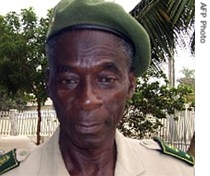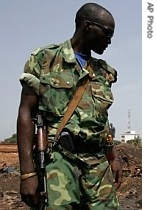2007年VOA标准英语-Guinea's Defense Minister Tries to Bring Soldie(在线收听)
Dakar
06 June 2007
Guinea's new defense minister is touring barracks across the West African nation for a second time since his appointment. He was named last month to help quell unrest caused by disgruntled soldiers. VOA's Nico Colombant reports from our regional bureau in Dakar.
 |
| The new Guinean Defense minister, General Bailo Diallo, attends an oath-taking ceremony 14 May 2007 in the capital Conakry following days of deadly strike and violence in Guinea |
He says they should excuse themselves for the unrest they caused, and start changing their attitude.
He is making these comments directly to soldiers during a weeklong tour, visiting different garrisons, including those along the border with Liberia and Sierra Leone.
During riots over unpaid wages in May, soldiers left a dozen people dead, when they shot guns in the air and at passers-by, while ransacking homes and looting.
They also stole some weapons, which some civilians complain they have now been using for petty crime.
A West Africa-based analyst with Human Rights Watch, Dustin Sharp, says the soldiers' main grievance, the back pay owed them, remains.
"I do not know that concretely that any of those promises have been met," he said. "Over the last couple of months, on numerous occasions, salary increases, and grade increases, and so on have been promised. It is usually enough to increase someone's grade, but coming up with the money in state coffers to increase salaries on a sustained basis is challenging."
 |
| A Guinean solder (file photo 20 Feb 2007) |
"The soldiers, they are not in a different lot than other government employees in Guinea. Teachers are poorly paid. Doctors are poorly paid. Nurses are poorly paid.
Government workers in general are poorly paid. What makes the military situation so dangerous is that soldiers have AK-47s and teachers do not," he added. "So I think the most important thing right now is that the Guinean military exercise a little bit of patience in understanding their lot cannot be significantly improved unless the economic circumstances that are causing misery all over Guinea are improved globally. That is going to take some time."
Sharp says many civilians are suspicious the army will just fight for their own interests.
"It is a dangerous situation for the country to be in," he explained. "The prime minister and his new government have many competing needs to stabilize and they have very little financial means to do it. And I think there is a real continuing risk that the military could play the role of spoiler in the progress we have seen so far this year."
Much of the power in Guinea including over the military, resides with ailing, diabetic, President Lansana Conte, in power since a coup in 1984.
When facing unrest, Mr. Conte has increasingly relied on crackdowns by the republican guard, led by one of his sons.